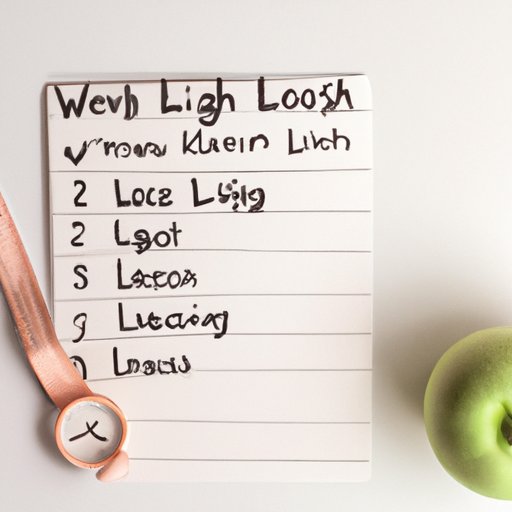
I. Introduction
Weight loss can be a frustrating and overwhelming journey, especially when it feels like all the popular diets and weight loss programs require you to drastically cut back on calories and feel hungry all the time. But the good news is that you don’t have to starve yourself to lose weight. There are plenty of simple tricks and lifestyle changes you can make to shed those extra pounds without feeling deprived. In this article, we’ll explore seven easy ways to lose weight without going hungry.
II. Eat High-Protein Breakfast
Starting your day with a high-protein breakfast can help you feel satiated and curb your hunger throughout the day. Not only that, but studies show that people who eat high-protein breakfasts tend to consume fewer calories throughout the day.
Some great high-protein breakfast options include scrambled eggs with avocado and whole-grain toast, Greek yogurt with fresh berries and nuts, or a protein smoothie with spinach and almond butter.
III. Drink Water Before Meals
Drinking water before meals can help you eat fewer calories and lose weight. Drinking water fills up your stomach, so you’re less likely to overeat during meals. Aim to drink at least 8-10 glasses of water per day, and try to drink a glass of water 30 minutes before meals.
If you struggle to drink enough water throughout the day, try adding a slice of lemon or lime to your water for some extra flavor. You can also try drinking herbal tea or adding natural flavors like cucumber or mint to your water.
IV. Cut Back on Sugar and Starches
Reducing your intake of sugars and starches can help you lose weight and improve your overall health. Sugars and starches are high in calories and can cause your blood sugar levels to spike, leading to cravings and overeating.
Instead of sugary snacks and starchy carbohydrates, try incorporating more fruits, vegetables, lean proteins, and whole grains like quinoa and brown rice into your diet.
V. Plan Meals Ahead
Planning your meals ahead of time can help you make healthier choices and avoid impulsive, high-calorie meals. Set aside some time each week to plan your meals, and make a grocery list so you have all the ingredients you need on hand.
Meal planning doesn’t have to be complicated. Start by planning a few simple meals that you enjoy and that are easy to prepare. You can also try batch cooking and preparing meals in advance to save time during the week.
VI. Focus on Whole Foods
Eating more whole foods like fruits, vegetables, and lean proteins can help you lose weight and improve your health. Whole foods tend to be lower in calories and higher in nutrients than processed foods.
Some great whole food options include leafy greens, berries, nuts, seeds, lean meats like chicken and fish, and whole grains like quinoa and brown rice. Try incorporating more whole foods into your meals by making simple swaps like replacing white bread with whole-grain bread or snacking on fresh fruit instead of sugary treats.
VII. Include Exercise in Your Routine
Exercise is an essential part of weight loss. Regular physical activity can help you burn calories, build muscle, and boost your metabolism. You don’t need to spend hours at the gym to see results – even small amounts of exercise can make a big difference.
Simple exercises like walking, jogging, or cycling can help you burn calories and improve your overall health. Try to aim for at least 30 minutes of moderate-intensity exercise most days of the week.
VIII. Get Enough Sleep
Getting enough sleep is essential for weight loss and overall health. When you don’t get enough sleep, your body produces more of the hormone ghrelin, which can increase your appetite and lead to overeating. Aim to get 7-9 hours of sleep per night to promote weight loss and overall health.
If you struggle to get enough sleep, try establishing a consistent sleep schedule, limiting caffeine and alcohol in the evening, and creating a relaxing bedtime routine.
IX. Conclusion
Losing weight doesn’t have to mean feeling hungry and deprived all the time. By incorporating these seven simple tips into your lifestyle, you can achieve your weight loss goals without sacrificing your favorite foods or feeling constant hunger pangs. Remember, sustainable weight loss is all about making small, consistent changes that you can stick to over time. Start by trying out one or two of these tips, and gradually incorporate more into your daily routine. With a little patience and persistence, you can achieve the healthy, happy weight you deserve.





